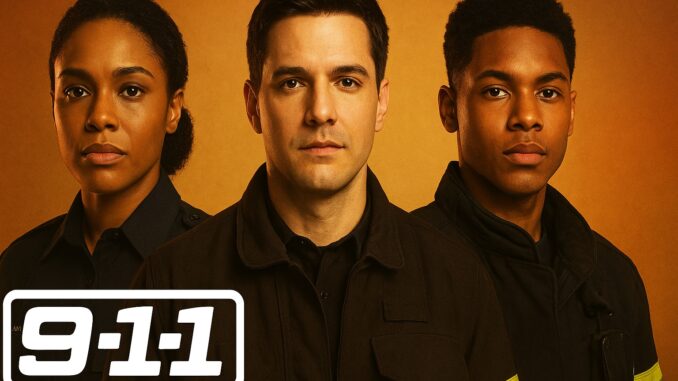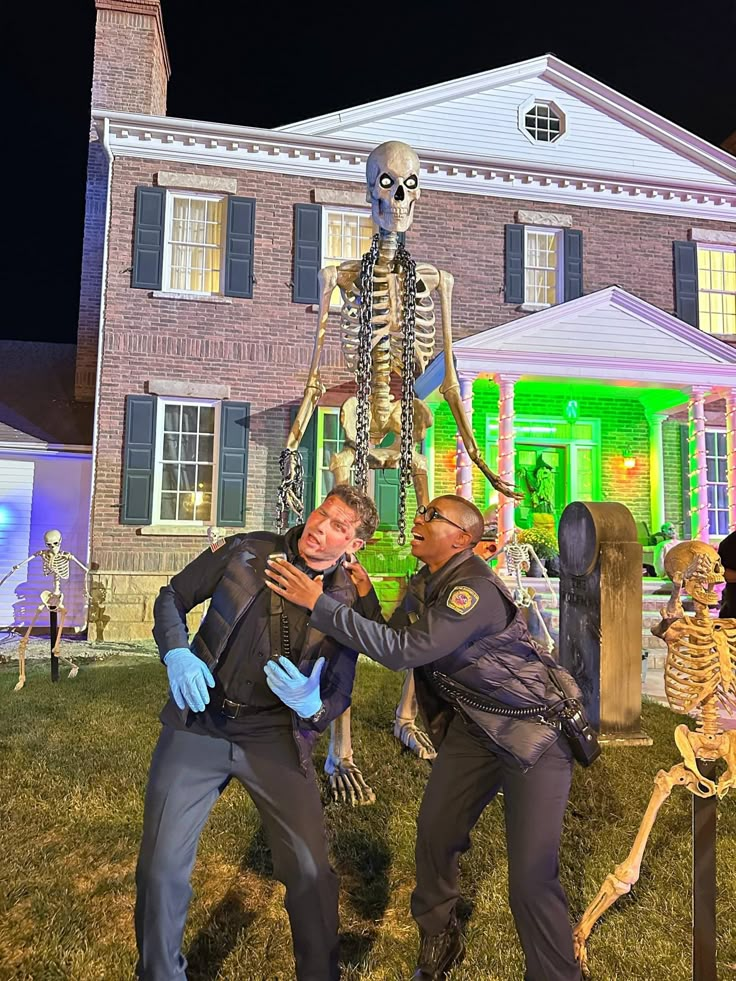
A Crisis at Station 118
According to Deadline, 9-1-1 season 9 has promoted two cast members in order to balance things out on the series. Corinne Massiah, who plays Athena Grant’s (Angela Bassett) daughter May Grant, and Elijah M. Cooper, who plays Harry Grant, have been upped to series regulars moving into 9-1-1 season 9. May and Harry have had fluctuating appearances on the show in recent seasons.
While it’s clear that Athena is still going to be reeling from Bobby’s passing when 9-1-1 season 9 returns, having two of her children around to ease the burden may be the best case scenario for the newfound widow. With both actors returning to the show in a larger capacity, 9-1-1 season 9 seems like it’s going to broaden its scope.
When 9-1-1 killed off Captain Bobby Nash, it wasn’t just a plot twist—it felt like a seismic jolt. The show immediately sparked a wave of backlash, grief, confusion, and even threats of boycotts from devoted fans. But now, as Season 9 looms, the producers are making bold moves: promoting two younger cast members and rethinking their narrative center. This article dives deep into the fallout, the strategy, and whether 9-1-1 can truly reinvent itself.
1. The Bobby Nash Backlash: Why Fans Are Furious
1.1 The emotional vacuum left behind
Bobby Nash was more than a character; he was the heart and moral core of Station 118. Fans felt groundless when he was removed. Longtime viewers described Bobby’s death as “devastating” and even a misstep that might cripple the series.
1.2 Critical voices and narrative regrets
Critics and commentators haven’t pulled punches. Many argue killing Bobby equates to gutting the show’s emotional anchor. TVLine called it “a huge mistake.” Screenrant warned that the over-the-top cases in Season 9 could “rub salt in the wound.” Still, others view the backlash as proof that people are deeply invested in 9-1-1’s characters.
1.3 Fan grief and online echo chambers
On forums and Reddit, the grief is raw:
“I hate that Bobby died. I ugly cried the whole time … it’s been a long time since something made me sob like that.”
Fans track every detail, question every decision, and remain skeptical about whether the show can recover from this perceived betrayal.
2. Why Did the Show Kill Bobby? A Creative Reset or a Miscalculation?
2.1 The official reason: creative evolution
Showrunner Tim Minear called Bobby’s death “entirely a creative decision,” claiming it would “give all of the characters more story.” In interviews, producers hinted they needed that dramatic break to open new narrative paths.
2.2 The risk-reward of radical change
There’s always risk: fans might abandon the show, the chemistry might shatter, or the plot may drift into chaos. Yet sometimes, bold risks keep shows alive rather than ossify them. 9-1-1 clearly bet on reinvention over safety.
2.3 The emotional arc they left behind
Bobby had a redemptive arc—from a flawed man to a leader who carried the weight of mental health, trauma, and care for his family and firehouse. Losing him means losing a narrative vessel many characters used to navigate their own journeys.
3. Season 9 Strategy: Promotions and New Focal Points
3.1 Enter the new frontrunners: May Grant & Harry Grant
The show is promoting Corinne Massiah (May Grant) and Elijah M. Cooper (Harry Grant) to series regulars for Season 9. These characters, formerly described as supporting, are now being elevated to help fill the void left by Bobby.
3.2 Why these two? Symbolism and balance
May and Harry carry emotional weight—they’re part of Athena’s family and share ties to legacy characters. Promoting them hints at investing in emotional lineage and continuity rather than starting fresh entirely.
3.3 Other cast changes and adjustments
Kenneth Choi’s Chimney appears to be positioning into a leadership role. A promo teases him stepping into Bobby’s duties, triggering speculation among fans. Behind the scenes, long-time cast members such as Oliver Stark, Ryan Guzman, Aisha Hinds, and Jennifer Love Hewitt remain anchors enforcing continuity.
4. Narrative Challenges & Opportunities Ahead
4.1 Keeping legacy alive: memory, dreams, flashbacks
One smart route is weaving Bobby into memory, dream sequences, and emotional resonances. Though he’s gone physically, his influence can still ripple through how others act.
4.2 Rebalancing station dynamics
Without Bobby as the mediator and moral glue, fractures within Station 118 will surface. Conflicts could intensify—but also force characters to mature. The show can explore themes like leadership void, grief, identity, and breaking cycles of loyalty.
4.3 Raising stakes with fresh arcs
Season 9 plans to employ bigger, more unpredictable cases (space, meteor showers, etc.). Pushing external pressure helps internal pressure—forcing characters into crisis, choice, and growth.
5. Can 9-1-1 Outlive Bobby Nash? A Risky Reboot
5.1 The strengths that remain
The show still has ensemble depth, emotional histories, and fan investment. Many fans aren’t leaving—they’re furious, but still watching. The backlash shows the emotional stakes are real.

5.2 The pitfalls they must avoid
-
Overcorrecting with melodrama: Pipelines could spiral into soap opera tropes.
-
Neglecting continuity: If new arcs contradict what came before, trust unravels.
-
Ignoring fan voices entirely: The emotional buy-in must be respected, not dismissed.
5.3 What “success” looks like now
Success won’t be restoring 9-1-1 exactly to what it was—it’ll be evolving into something its audience can accept, empathize with, and root for anew. If May, Harry, Chimney, Buck, Athena, Maddie, and others feel fully alive again, that’s a win.
Conclusion
Killing Bobby Nash was a dangerous move—one that invited heartbreaking grief, harsh critique, and fear that 9-1-1 might lose its soul. But the show’s willingness to promote internal characters, rework its narrative focus, and lean into dramatic upheaval shows ambition. Season 9 isn’t about erasing the past—it’s about forging a new identity under pressure. The question: can 9-1-1 convince its fans that it didn’t kill its heartbeat—for nothing?